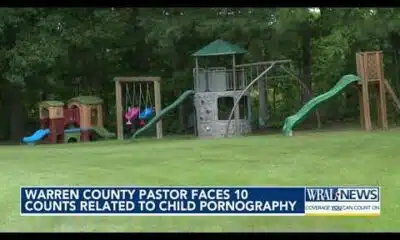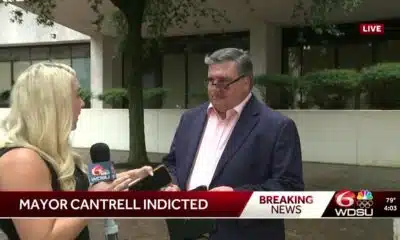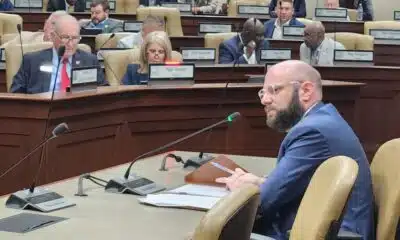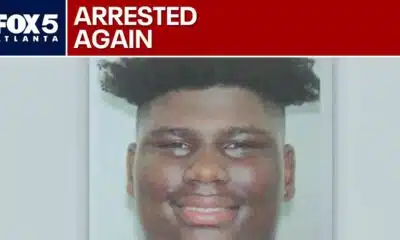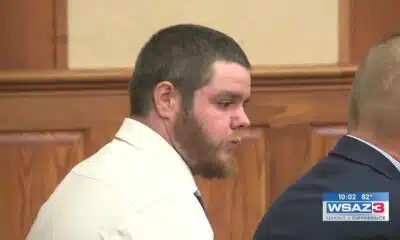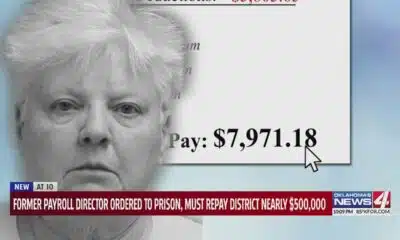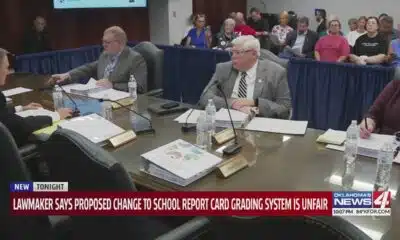News from the South - Alabama News Feed
District of Columbia sues Trump administration over ‘hostile takeover’ of police force
by Ariana Figueroa, Alabama Reflector
August 15, 2025
WASHINGTON — The Department of Justice will rewrite an order from Attorney General Pam Bondi that initially placed a Trump administration official in charge of the District of Columbia’s police force, after an emergency hearing late Friday afternoon on a lawsuit filed by the district.
Attorneys on behalf of the Justice Department told District of Columbia Judge Ana C. Reyes they would rewrite Section 1 of Bondi’s order by a deadline the judge set of 6:30 p.m. Eastern Friday.
In that section, Bondi’s late Thursday order named Terry Cole, administrator of the Drug Enforcement Administration, as head of the Metropolitan Police Department.
District of Columbia Attorney General Brian Schwalb called that move a “brazen usurpation of the district’s authority” in his suit filed early Friday against the Trump administration.
Reyes, who was nominated by former President Joe Biden, said if she did not receive the new order by the deadline, she would issue a temporary restraining order against the DOJ. She said she found that section of Bondi’s order “plainly contrary to statute” of the district’s Home Rule Act of 1973.
The exact changes to the order were not immediately available.
District filed suit Friday
Schwalb early Friday sued the Trump administration for taking control of the Metropolitan Police Department’s 3,400 officers.
The suit in U.S. District Court for the District of Columbia argued that President Donald Trump’s Monday executive order to federalize the district’s police force “far exceeded” the president’s authority under the Home Rule Act of 1973 that allows Washingtonians to elect their local leaders, but gives Congress control over local laws and the district’s budget.
Trump has warned he may pursue similar action in other Democratic-led cities that he sees as having “totally out of control” crime, though experts have questioned the legality and mayors already have raised objections.
“This is the gravest threat to Home Rule DC has ever faced, and we are fighting to stop it,” Schwalb, a Democrat elected in 2022, wrote on social media. “The Administration’s actions are brazenly unlawful. They go well beyond the bounds of the President’s limited authority and instead seek a hostile takeover of MPD.”
District Mayor Muriel Bowser pushed back on Bondi’s order, and wrote on social media that “there is no statute that conveys the District’s personnel authority to a federal official.”
“Let us be clear about what the law requires during a Presidential declared emergency: it requires the mayor of Washington, DC to provide the services of the Metropolitan Police Department for federal purposes at the request of the President,” she said. “We have followed the law.”
The suit asks for a judge to vacate Bondi’s order and an order to prevent the Trump administration from “from issuing any future orders or directives or taking any other action that attempts to place MPD under the control of anyone other than the Mayor and the Chief of Police, otherwise assert operational control over MPD, or otherwise attempt to direct local law enforcement activities.”
The suit does not challenge Trump’s decision to deploy 800 National Guard members to the district. Because the district, home to more than 700,000 residents, is not a state, the president has the sole authority over the National Guard members.
Carjacking preceded Trump order
Trump earlier this week declared a “crime emergency” after a former U.S. Department of Government Efficiency, or DOGE, official was injured on Aug. 3 in an attempted carjacking incident around 3 a.m. Eastern near the Logan Circle neighborhood. Two Maryland teenagers were arrested on charges of unarmed carjacking in connection with the incident.
Violent crime in the district is at a historic 30-year low.
The suit notes Trump’s previous comments about his plans for the district, from his time as a 2024 presidential candidate to his most recent remarks about taking over control of the district while at a February press conference.
“I think that we should govern the District of Columbia … I think that we should run it strong, run it with law and order, make it absolutely flawless … And I think we should take over Washington, D.C. … We should govern D.C. The federal government should take over the governance of D.C.,” Trump said in the court document.
Advocates and local leaders have criticized the president’s decision, arguing that the move is nothing more than an extension of the administration’s immigration crackdown. Checkpoints have popped up all over the city in communities with a high immigrant population.
Additionally, the district’s police chief Thursday issued a new order to allow local police to aid federal officials in immigration enforcement for immigrants not in police custody.
Trump praised Thursday’s order, calling it “a very positive thing,” especially at checkpoints in the district.
“When they stop people, they find they’re illegal, they report them, they give them to us,” he said.
Last updated 4:33 p.m., Aug. 15, 2025
Alabama Reflector is part of States Newsroom, a nonprofit news network supported by grants and a coalition of donors as a 501c(3) public charity. Alabama Reflector maintains editorial independence. Contact Editor Brian Lyman for questions: info@alabamareflector.com.
The post District of Columbia sues Trump administration over ‘hostile takeover’ of police force appeared first on alabamareflector.com
Note: The following A.I. based commentary is not part of the original article, reproduced above, but is offered in the hopes that it will promote greater media literacy and critical thinking, by making any potential bias more visible to the reader –Staff Editor.
Political Bias Rating: Center-Left
The content presents a critical perspective on former President Donald Trump’s actions regarding federal control over the Washington, D.C. Metropolitan Police Department, emphasizing legal challenges and local opposition led by Democratic officials. While it includes factual details and statements from multiple sides, the framing highlights concerns about federal overreach and the defense of local governance, which aligns more closely with a center-left viewpoint. The article maintains a mostly neutral tone but leans toward skepticism of the Trump administration’s measures.
News from the South - Alabama News Feed
Conversion therapy for LGBTQ+ people, long discredited, could make a comeback
by Anna Claire Vollers, Alabama Reflector
August 13, 2025
Week after week, a teenage Brandon Long sat through counseling sessions that he said framed his identity as a failure.
Now an ordained minister in northern Kentucky, Long told Kentucky state lawmakers about the years he spent undergoing therapy designed to rid him of his “same-sex attraction.”
“Just imagine yourself being told, session after session, that if you remained as you were, you would be rejected,” he said.
GET THE MORNING HEADLINES.
Long testified in February before a Kentucky House committee against a Republican-sponsored bill that would cancel Democratic Gov. Andy Beshear’s 2024 executive order that banned a controversial practice known as “conversion therapy” for minors.
Conversion therapy is a catchall term for controversial efforts to change the sexual orientation or gender identity of LGBTQ+ people. Sometimes called “reparative therapy,” it can range from talk therapy and religious counseling to electrical shocks, pain-inducing aversion therapy and physical isolation.
The bill, Long told lawmakers, “creates a legal shield for conversion therapy, allowing parents to force their children into a practice condemned by every major medical and mental health organization worldwide.”
Kentucky’s Republican-controlled legislature passed the bill, then overrode the governor’s veto in March.
Conversion therapy has been denounced by major medical organizations including the American Medical Association, American Psychological Association, American Psychiatric Association and the American Academy of Child and Adolescent Psychiatry. They say it’s ineffective and harmful and puts LGBTQ+ people at risk for depression, substance use, suicide and other mental health issues.
More than half of states have banned or restricted the practice for underage patients since California became the first to do so in 2012, according to the Movement Advancement Project, a nonprofit research organization that tracks LGBTQ+-related laws and policies.
But political currents are shifting. Conservative majorities in the courts, in state legislatures and at the federal level have reshaped the legal landscape, opening the door for Republican lawmakers and conservative Christian groups to reinstate a practice that has been roundly discredited by the medical community.
In March, the U.S. Supreme Court agreed to hear a case challenging Colorado’s 2019 conversion therapy ban on freedom of speech grounds. The decision marks a change from 2017, when the court refused to hear a challenge to California’s ban, and 2023, when it declined to hear a challenge to Washington’s ban.
The high court’s decision, which isn’t expected until next year, could reverse — or solidify — conversion therapy bans across the country.
Last month, a Virginia court partially struck down the state’s 2020 law banning conversion therapy for minors, a win for conservative Christian organizations. GOP lawmakers in Michigan have introduced a bill to repeal the state’s ban. And Missouri‘s Republican attorney general has filed suit to overturn local conversion therapy bans.
On the flip side, in Wisconsin, the state Supreme Court cleared the way earlier this year for the state to permanently ban the practice.
‘The world has changed’
While organized attempts to “cure” homosexuality have been around for centuries, “ex-gay” groups that promised to change a person’s sexual orientation began gaining ground in the 1990s as policy debates arose over same-sex marriage and gay people serving in the military, said Dr. Jack Drescher, a psychiatrist and psychoanalyst in private practice in New York City. He is also a clinical professor of psychiatry at Columbia University whose research has focused on gender and sexuality.
But after Massachusetts legalized same-sex marriage in 2004 and more states followed, the influence of conversion therapy proponents waned.
As of this year, 23 states and Washington, D.C., prevent licensed health care providers from subjecting minors to conversion therapy, according to an analysis of state laws by the Movement Advancement Project. Four more states restrict the practice, such as by not allowing public funding to go toward conversion therapy services.
State laws typically levy fines or discipline the professional licenses of practitioners who try to engage minors in conversion therapy. They don’t necessarily prevent clergy or unlicensed counselors from attempting such counseling.
The bans are more of a public statement of acceptance of LGBTQ+ people, rather than a commonly used preventive measure, said Drescher.
“The bans are reinforcements of the belief that if homosexuality is not a mental disorder or disease, there’s no reason to pretend you can treat it, and anybody who tries is acting outside the mainstream of science,” Drescher told Stateline.
The American Medical Association has written model legislation for state lawmakers who want to ban conversion therapy, a reflection of the broad consensus in the medical community that homosexuality and gender nonconformity are not mental illnesses, said R.J. Mills, a representative from the American Medical Association, in a statement to Stateline.
In the past, some leading psychiatric and psychological associations were hesitant to support state restrictions because they saw the laws as intrusions into the doctor-patient or therapist-patient relationship, Drescher said.
Everybody understands what’s at stake now.
– Dr. Jack Drescher, a psychiatrist and psychoanalyst in New York City whose research focuses on gender and sexuality
Now, spurred by Trump administration policies that place new restrictions on LGBTQ+ people and the most conservative U.S. Supreme Court in generations, medical organizations are growing more vocal in their opposition to conversion therapy.
“The world has changed,” Drescher said. “Everybody understands what’s at stake now.”
Free speech argument
Conservative legal firms have filed lawsuits in states such as Colorado, Michigan and Virginia on behalf of Christian counselors who say the laws prevent them from practicing according to their faith-based values. They say the bans should be repealed so practitioners won’t face losing their careers over providing services informed by their faith.
A Virginia court last month oversaw a consent decree in which Virginia agreed to not fully enforce its 2020 conversion therapy ban and to allow counselors to engage in talk conversion therapy with minors. The plaintiffs in the case were John and Janet Raymond, state-licensed professional counselors in Virginia who were represented by the Founding Freedoms Law Center, an organization that takes on conservative legal causes.
The kind of talk therapy now allowed can involve conversation, prayer and sharing of written materials such as religious scriptures, said Josh Hetzler, the Raymonds’ attorney, during a public news conference following the court decision.
“With this court order, every counselor in Virginia will now be able to speak freely, truthfully and candidly with clients who are seeking to have those critical conversations about their identity, and to hear faith-based insights from trusted professionals,” he said.
Conservative legislators also are citing their Christian faith in their attempts to roll back state bans.
Michigan state Rep. Josh Schriver, a Republican, filed a package of bills last month aimed at repealing a handful of what he calls “anti-Christ laws,” including Michigan’s 2023 ban on conversion therapy for youth.
A legislative aide said Schriver wasn’t available for an interview, and instead referred Stateline to the recent Substack post he emailed to his constituents.
“As legislators, we’re duty-bound to remove statutes that overstep the authority given by our state and federal Constitutions,” Schriver said in the post.
Long, the Kentucky minister, said the bans are needed because “no one enters conversion therapy willingly.”
“The only reason a child would go through it is because a trusted authority in their life — a parent, a pastor or a therapist — has told them that they are broken and need to be fixed.”
At least five states have a law or policy prohibiting or deterring local-level ordinances that aim to protect youth from conversion therapy.
Some states without such laws are going after municipalities that have banned conversion therapy.
Missouri Republican Attorney General Andrew Bailey in February sued Jackson County, Missouri, home to Kansas City, challenging the county’s 2023 ordinance and Kansas City’s 2019 ordinance, both of which ban licensed counselors from engaging in conversion therapy with minors.
“Our children have a right to therapy that allows for honest, unrestricted conversations, free from transgender indoctrination,” Bailey said in a statement in February. He called the ordinances “a dangerous overreach” that violate free speech and religious liberty rights.
A Republican loss
In at least one state, conservatives have hit a legal roadblock.
In Wisconsin, Democratic Gov. Tony Evers’ administration has been trying since 2020 to enact a statewide conversion therapy ban proposed by the state agency that oversees provider licensing.
But the ban has been blocked twice by a Republican-controlled legislative committee.
Evers’ administration sued.
The Wisconsin Supreme Court sided with Evers last month, ruling that the state legislative committee was overreaching and couldn’t block the rule.
Stateline reporter Anna Claire Vollers can be reached at avollers@stateline.org.
Stateline is part of States Newsroom, a nonprofit news network supported by grants and a coalition of donors as a 501c(3) public charity. Stateline maintains editorial independence. Contact Editor Scott S. Greenberger for questions: info@stateline.org.
Alabama Reflector is part of States Newsroom, a nonprofit news network supported by grants and a coalition of donors as a 501c(3) public charity. Alabama Reflector maintains editorial independence. Contact Editor Brian Lyman for questions: info@alabamareflector.com.
The post Conversion therapy for LGBTQ+ people, long discredited, could make a comeback appeared first on alabamareflector.com
Note: The following A.I. based commentary is not part of the original article, reproduced above, but is offered in the hopes that it will promote greater media literacy and critical thinking, by making any potential bias more visible to the reader –Staff Editor.
Political Bias Rating: Center-Left
The content presents a detailed critique of conversion therapy, emphasizing its condemnation by major medical organizations and highlighting the negative experiences of LGBTQ+ individuals subjected to it. It frames legislative efforts to reinstate or protect conversion therapy as aligned with conservative and Republican interests, often linked to religious motivations, while portraying bans on the practice as protective and supported by scientific consensus. The article also gives voice to conservative legal arguments but maintains a critical tone toward them. Overall, the piece leans toward a center-left perspective by supporting LGBTQ+ rights and medical consensus while critically examining conservative policies and actions.
News from the South - Alabama News Feed
News 5 NOW at 12:30pm | Aug. 13, 2025
SUMMARY: On August 13, 2025, News5 Now reported several key stories. A Pritchard police officer, Malachi Lagon, was arrested for theft and distributing explicit images without consent. Midtown Mobile experienced a power outage affecting about 1,000 people, with power expected to return by 4 p.m. A body was found in George County, Mississippi, prompting a homicide investigation. Lifeguards attributed a drowning in Gulf Shores to rip currents amid stormy surf. Baldwin County received heavy rain, about 11 inches, with few flooding reports. Municipal election deadlines were highlighted, and viewers were invited to participate in a poll about Taylor Swift’s upcoming album.
A Prichard police officer has been arrested; more than 1,000 people in Mobile without power today; and a body found in George County, Mississippi
News from the South - Alabama News Feed
Prefiled Bill Would Create Harsher Punishments for School Threats | Aug. 12, 2025 | News 19 at 6 p.m
SUMMARY: A prefiled bill in Alabama aims to impose harsher punishments for school threats, including up to 20 years in prison and mandatory student suspension. Senator Matt Woods emphasizes the need to curb false threats, which divert law enforcement from real emergencies and cause fear among students. The bill would hold families accountable for threats, whether jokes or hoaxes, and require school administrators to notify law enforcement. Baldwin County Sheriff Huey Hoss Mack supports the measure, especially with new cellphone regulations in schools. Representative Patrick Sellers highlights the importance of creating safe learning environments. The bill passed the House last year but stalled in the Senate; it will be reintroduced next session.
Officials said school threats are no joke, and should be taken seriously. With a pre-filed bill, lawmakers hope to curb terroristic threats on and off school campuses.
News 19 is North Alabama’s News Leader! We are the CBS affiliate in North Alabama and the Tennessee Valley since November 28, 1963.
https://whnt.com/
https://www.facebook.com/whntnews19
https://www.instagram.com/whntnews19/
https://twitter.com/whnt
-
News from the South - Oklahoma News Feed6 days ago
Former payroll director ordered to prison, must repay district nearly $500,000
-
News from the South - Texas News Feed7 days ago
Jim Lovell, Apollo 13 moon mission leader, dies at 97
-
News from the South - Tennessee News Feed6 days ago
Dollywood shares hints about new attraction coming in 2026
-
News from the South - Georgia News Feed6 days ago
GBI identifies Emory University, CDC shooting suspect
-
News from the South - Louisiana News Feed7 days ago
Rural emergency rooms are increasingly run without doctors, experts say
-
News from the South - South Carolina News Feed6 days ago
Governor to set limits on SNAP benefits.
-
News from the South - Oklahoma News Feed7 days ago
Lawmaker says proposed change to school report card grading system is unfair
-
News from the South - Georgia News Feed6 days ago
Patrick Joseph White: Who is the accused Emory and CDC shooter?

